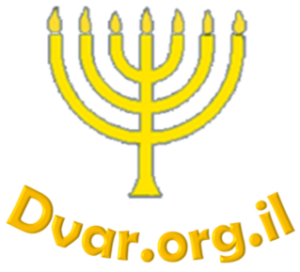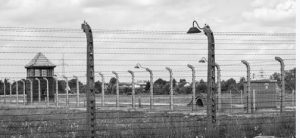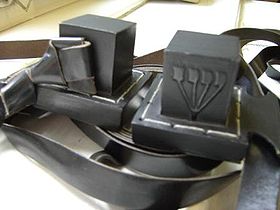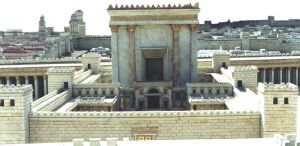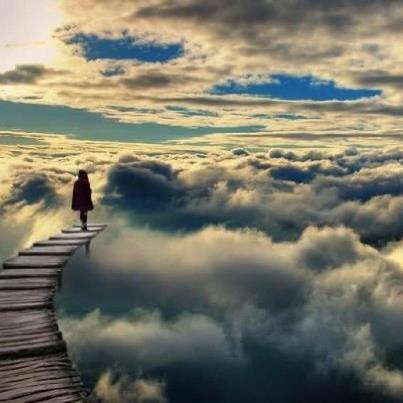
Concerning the Matriarch Sarah, we are told that she was “as beautiful at twenty as seven, as sinless at one hundred as at twenty”. It’s hard to understand why Sarah’s beauty is mentioned here at all, especially following her death. The answer is that just as wealth and poverty serve to test man, so does beauty. Thus, after death, if someone excuses his sins with his handsomeness, he is asked, “Were you more handsome than Yosef?”
– who we know had the test of being tempted by Zeleicha, the wife of Potiphar. If this is so for a man, how much more so for a woman, whose beauty is so central to her existence? Just as at twenty Sarah was innocent (for the heavenly tribunal does not punish before then), so, too, at one hundred. Additionally, in the first verse of the Sedra, in telling Sarah’s final age, it mentions the seemingly redundant expression “the years of Sarah’s life,” to teach us that she did not merely live, but lived on the most glorious level of existence ever granted to man.
When Abraham mourned Sarah, we are told that first he eulogised her and then he cried for her. A mourner generally cries first, and eulogises afterwards, and this is only natural. But why did Abraham put eulogy before his weeping? Moreover, we are told that Abraham only cried a little. Why was this?
Weeping generally does not involve a recognition of the loss and it’s significance. Eulogising, however, means consciously taking stock of the extent of the loss, and how the deceased benefited family and community. When Sarah died, it was different. She was greater than Abraham in prophecy; she fed all the passers-by who came to his tent (the burden of hospitality falls chiefly on the wife); she even taught women about G-d, bringing them near to Him to serve Him. Thus the loss incurred by the entire world was greater than Abraham’s personal loss. He choked back his tears, which were lost among far greater tears over the loss to the whole world.
We are told that the Angel of Death appeared to Sarah disguised as Isaac. He explained that Abraham had built an altar and took the knife to slaughter him. Before he could finish, Sarah’s soul left her. Why did the Angel of Death use these tactics? Because Sarah was so holy, he could not take her soul. Therefore, he distracted her from her holy work for a moment, by informing her of the Akeidah (binding of Isaac) and then took her soul, as was his duty.
The next section concerns Abraham’s servant Eliezer, who was sent to find a wife for Isaac. Why did Abraham not go himself? The parsha tells us “Abraham was old, well on in years”. As for sending Isaac, this was also impossible: after the Akeidah, he had become like a holy sacrifice, so it was forbidden for him to leave the Land. Now that Abraham had finished his ten trials (all of which he passed with flying colours) he enjoyed complete tranquility and was “blessed with everything.”
Abraham commanded his servant Eliezer to find Isaac a wife from “among whom I dwell” i.e. his own family, as opposed to the Canaanites who dwelled in the Land. One reason for this is that G-d promised Canaan to Abraham, and therefore if Isaac would marry a Canaanite (who were a cursed people anyway), Abraham’s descendants would find it difficult to destroy them and inherit the Land. Another reason is connected with the fact that Abraham was ideologically alone – Abraham stood on one side of the river, and the world on the other. He therefore wanted Eliezer not to leave Isaac with the girl’s family, but rather to bring them home, so that he could educate her in the ways of G-d.
Eliezer took ten of Abraham’s camels. These camels were recognised everywhere because they were kept muzzled to prevent them from eating other people’s produce. The Talmud tells us that the holiness of the famous Rav Pinchas ben Yair was such that he influenced his donkey not to eat anything forbidden or stolen, although it wore no muzzle. Abraham was certainly as righteous – why did his camels need muzzles? One answer – it was to set an example for others. Another answer – Abraham didn’t want to appear conceited, so he left the camels muzzled so as not to rely on his own saintliness.
Eliezer goes on his journey, and stops outside the city to water his camels. Surely he would have had more success if he would have gone into the city – he might have stood a chance of getting a good shidduch there. Simple answer – the city was full of idols. Anyway, as we know, he was to find a good shidduch in Rivka. Eliezer says “Let it be that the maiden to whom I shall say ‘Please tip over your jug so that I may drink’ and who replies ‘Drink, and I will even water your camels’ ”, etc. We are faced with that well-known question: why did Eliezer depend on a sign of this sort instead of going straight to the girl’s family and suggesting a match?
The answer is that he thought that the family would not let the girl go to a foreign land with a man that they did not know. But when G-d arranged for the two to meet in such a miraculous way, Laban and Bethuel (Rivka’s brother and father respectively) had to say “The matter stems from Hashem!….here Rivka is before you; take her and go”. Besides this, these two gangsters were after the gold and other goodies that Eliezer bought with him.
As we know, Rivka waters all ten camels without even being asked. But did Eliezer have to stay and watch her water all ten? This was a strenuous task. Surely he could have stopped after two; after all, she did say that she was going to do it. One reason is that Eliezer wanted to see if she was healthy, after ascertaining that she was beautiful and kind. Another reason is that he wanted to see if Rivka would do as she said, rather than leaving the job unfinished. Abraham himself was a master on consistency, despite “saying little and doing much” – and these qualities were reflected in Rivka.
Rivka and Eliezer left Charan at noon time and arrived in Be’er Sheva that afternoon already. Hashem performed a miracle to make the journey shorter. As the caravan approached, Rivka saw the noble figure of a man whose right hand was stretched out in prayer towards Heaven. He was surrounded by the light of the shechina (G-d’s Divine Presence), and above him hovered an angel to guard him. “This must be a great man,” Rivka thought. She asked Eliezer who he was.
“It is my master,” he replied. Rivka immediately offered thanks and praise to Hashem that she was destined to marry this tzaddik, but suddenly she had a vision that a wicked son (Eisav) would be born from her. She trembled and fell from the camel, sliding to the ground.
Before meeting Yitzchak, Rivka modestly covered herself with a veil. Eliezer brought Rivka to Avraham and Yitzchak and told them of all the miracles that had happened. Before Yitzchak married her, Avraham said to him, “You must make sure that Eliezer did not touch Rivka while he was travelling with her, since Eliezer is a member of the Canaanites who are suspect of immorality.”
Avraham cast false suspicion on Eliezer, who was innocent. In return, Eliezer was repaid by Hashem by being taken to Gan Eden (The Garden of Eden) alive.
Yitzchak had mourned his mother Sarah’s death for three years. Every time he had entered her tent and found it dark, he sank into despondency. As long as Sarah was alive, the candle in her tent burned from one Shabbat to the next, the dough was blessed, and the shechina rested above her tent. After Sarah’s death, all three blessings ceased. Now that Rivka entered the tent, they all returned.
Why did Sarah deserve these three miracles? She was meticulous in observing the three mitzvot given specifically to women – lighting candles for Shabbat, separating challah from the dough, and upholding the laws pertaining to nidda (ritual purity). In return, Hashem rewarded her with three blessings:
1. For being careful with the challah, her dough was blessed.
2. As a reward for lighting the candles, her light burned from one Shabbat to the next.
3. For purifying herself, the Cloud of the shechina rested above her tent, (since the state of purity leads to the presence of the shechina).
All three signs reappeared for Rivka because she observed these mitzvot with the same precision as Sarah did. Thus, Yitzchak found comfort in his wife, and no longer mourned for his mother.
Shabbat Shalom
Ten things you probably never knew about Abraham!
1 Abraham’s father Terach was seventy years old when Abraham was born (Sefer Hayashar, Noach).
2 By the age of ten, Abraham was in the house of Noah and his son Shem. He learned Torah and fear of G-d for thirty nine years, and returned to his father’s house (ibid).
3 Abraham buried his father two years before the death of Sarah (Seder Olam, 1).
4 Jacob served Abraham for fifteen years (ibid).
5 Esau took five years off Abraham’s life (Pesikta D’Rav Kahana, 3:34)
6 Abraham was worthy of being created before Adam, but G-d said “Perhaps Adam will spoil things [by sinning] and there will be no-one to set things right. Therefore I will create Adam first, so that Abraham will come and repair what he spoils.” (Bereishit Rabbah, 14:6).
7 When Abraham was born, his father Terach entrusted him to the care of Nahor who taught him idolatry. But Abraham did not learn it, because he was set apart for the Name of G-d (Otzar Midrashim, 399).
8 Isaac’s face resembled Abraham’s (Bava Metzia 87a).
9 Abraham said to G-d “Master of the Universe, I looked at my constellation and saw that I am unfit to beget a son”. G-d said to him “Abandon your astrological speculation. Israel is not under the influence of the constellations” (Shabbos 156a).
10 Whoever calls Abraham ‘Abram’ violates a positive commandment (Berachot 13a).
SHABBAT SHALOM
